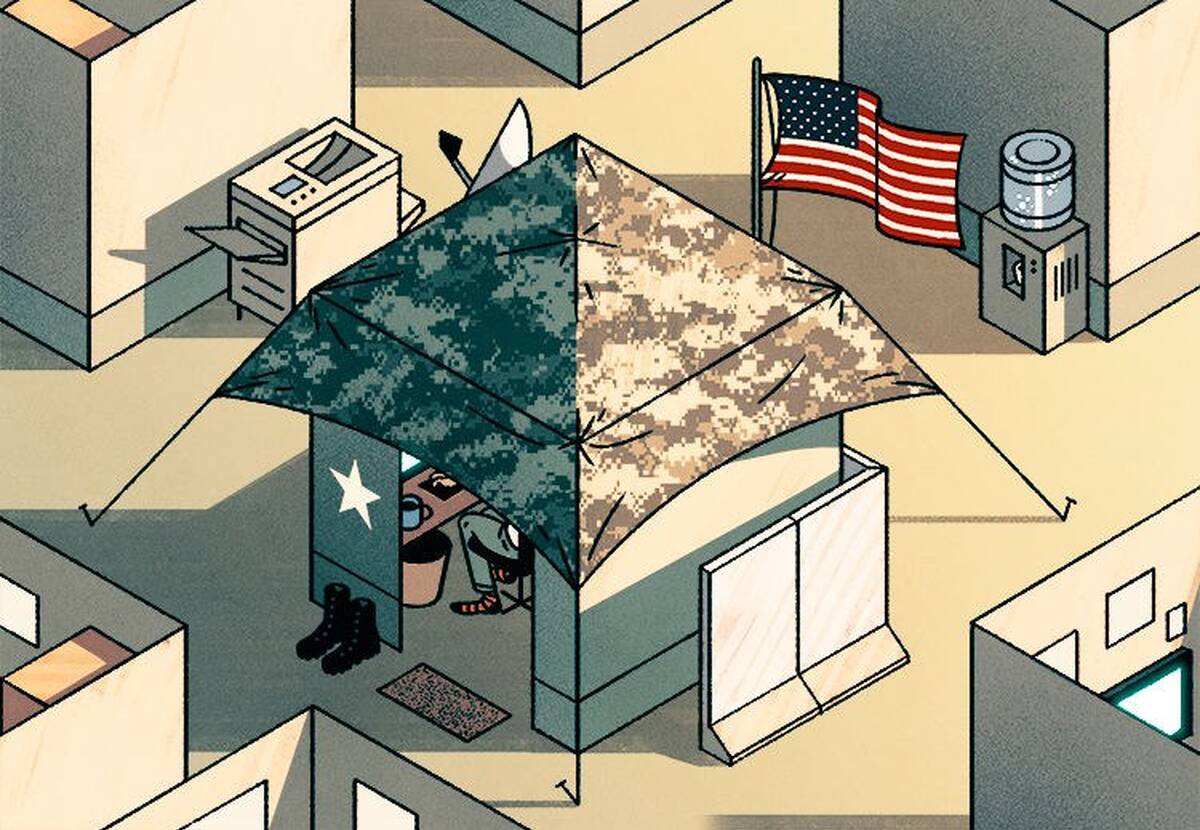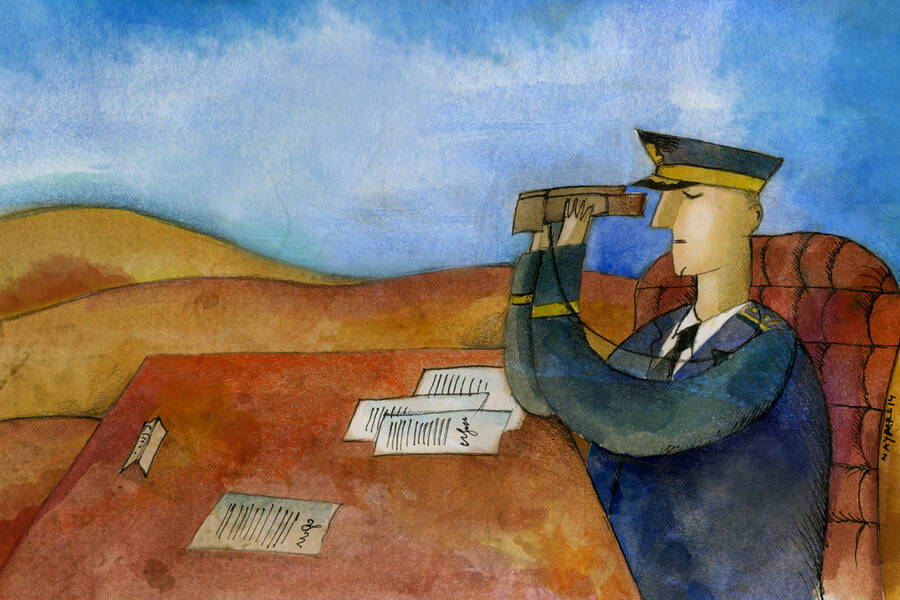Podcast transcript
Jessica LOVE: The military has a prominent place in our nation’s mythology. Yet less than half of one percent of the American population is currently serving in the armed forces. As a result, a lot of us get our ideas and assumptions about the military—and what soldiers, sailors, and marines actually do—from the media rather than from servicemembers themselves.
That means we don’t often learn how the military trains its men and women to be flexible, collaborative leaders. Or why companies should consider hiring veterans for exactly this reason.
Welcome to the Kellogg Insight podcast. I’m your host, Jessica Love. Today we’re going to discuss what makes veterans so valuable in the corporate world.
First, Producer Fred Schmalz talks to Colonel Dan Friend about the skills and experiences military personnel acquire during their service—and how those can translate into the business arena. Then I will speak with Kellogg finance professors Carola Frydman and Efraim Benmelech about why former soldiers may make good CEOs. Stay with us.
[music interlude]
Dan FRIEND: People get their exposure to the military from movies, TV, and stuff. The stereotypical military movie is you’ve got some leader that’s yelling, that’s in the face providing direction, and people are just executing.
Fred SCHMALZ: That’s Colonel Dan Friend, the current U.S. Army chief of staff senior fellow at the Kellogg School. With more than 26 years in the service, he knows the military instills skills that are much more valuable and nuanced than the stereotypes we see on the silver screen. He also knows that few Americans realize how well those skills and experiences translate to the corporate world.
Part of that has to do with the relatively small number of people who serve these days.
FRIEND: In the past decades, we had a much larger percentage of the population that served, that were veterans. So you could walk into an organization, and if you said you were a platoon sergeant, if you said you were a battalion or a brigade commander, or even if you just put the rank that was out there that you were associated with, it was a common terminology within a matter of seconds that somebody would understand.
SCHMALZ: That’s a serious challenge for veterans entering the workforce. Imagine having years of experience that no one understands how to translate and utilize.
It can also be a serious drawback for companies that may be overlooking an enormous source of talent.
So what qualities do veterans possess that makes them so valuable in the business world?
First, veterans have honed their ability to adapt and overcome difficulties—a trait that doesn’t disappear once someone leaves the service.
FRIEND: There’s this world out there that you have to go ahead and understand and adapt to, just like you did when you went on different missions where you didn’t know exactly what you were going on. You may be trained to either fly helicopters, or you may be that young infantry soldier that has been trained to learn basic infantry tactics and techniques, but then you may be called to do something totally different. It could be putting out fires, providing humanitarian relief. It could also be working with other militaries to develop their proficiency and their professionalism.
SCHMALZ: So companies that want employees who can think on their feet—and who doesn’t?—would do well to consider veterans.
The military also provides no shortage of opportunities for young servicemembers to become leaders.
FRIEND: You take your 20-year-olds, your 22-, 24-year-olds, they can have anywhere from a small squad that’s underneath them to a platoon that’s underneath them. A platoon can be 40 people. They’re responsible for their health, their welfare, completing the mission, making sure that they’re trained, any equipment that’s assigned to it. They’re given the opportunity at a much younger age than a lot of their peers on the outside.
SCHMALZ: Not only do these young men and women have the opportunity to take command, but they also get practice working with people from different walks of life and focusing on commonalities rather than differences—all things that make a leader more effective at bringing a team together.
FRIEND: We come from a diverse population. All over the country, different backgrounds, but when we bring them in, we have to go ahead and give them an area that they come together on. We appreciate the diversity. We want the diversity, but you do have to have a common belief in the service’s values and our mission to go ahead and bring us all together.
SCHMALZ: Chief among those values is selflessness, according to Friend. Military leaders are trained to think with a bias toward the greater good. The organization comes first, rather than the leader’s personal interests.
FRIEND: It’s really having more of that collaborative engagement. You are always thinking about your team, your platoon, your company—whatever the organization is—and how you do better there instead of just your own personal career path. Everyone wants to do well individually. Everybody wants to have those opportunities to increase in rank. But I think we really start to show that if you go ahead and put your effort and your heart behind the organization, those promotions, those other incentives will come naturally, and it’s a mindset that really sticks with you.
SCHMALZ: Veterans are also trained to focus on constant improvement through constructive criticism. One tool that the military has used for decades that is making its way into businesses is the “After Action Review.”
FRIEND: That’s something that we do constantly within the military. It’s that constant feedback loop, whether it’s at the organization level or the individual level. Either a formal or informal review of what just took place and you highlight the points that you want to sustain, the points that you need to improve on. It’s so much better than the guessing games that could be going on. “How am I performing? How is the unit performing?”
SCHMALZ: After Action Review doesn’t just happen from the top down. It’s also designed for the leaders of the organization to learn what they could be doing differently.
FRIEND: Having seniors that are able to go ahead and receive that as well and then adjust to go ahead and help the organization as a whole—it’s incredible when it happens.
[music interlude]
LOVE: We’ve talked a lot about good qualities that veterans can bring to an organization. But what happens when veterans are sitting at the very top of the organization? And are there ways to quantify the benefits that they bring?
For answers to these questions, we turn to some research from two Kellogg professors, Efraim Benmelech and Carola Frydman.
These days, Benmelech is a professor of finance here at Kellogg. But before becoming an academic, he spent six years in the Israeli Defense Forces, where he served as the chief operating officer of a paratrooper brigade.
Years ago, this history of military service would have given him something in common with the majority of American CEOs. Because of the drafts during World War II and the Korean and Vietnam Wars, CEOs in the 1980s and ‘90s were exponentially more likely to have some military experience compared to their counterparts today.
Among large, publicly held firms, the proportion of CEOs with a military background plunged from almost 60 percent in 1980 to only 6.2 percent in 2014.
So does having a CEO with military experience impact how a company performs? Benmelech and Frydman suspected the answer was yes. Here’s Benmelech explaining why.
Effi BENMELECH: One element is the organizational skills that one can acquire in the military service. The reason for that is that military and other armed forces are very large organizations that have a large degree of coordination and logistics and bureaucracy, which hardly exist in other organization in that scale in the private sector.
The second element had to do with the individual himself or herself. We thought, as part of the service in the military, there is a set of values that is instilled in an individual. We wanted to see whether this set of values eventually is being reflected in outcomes or behavior types of those leaders.
LOVE: His colleague Frydman agrees.
Carola FRYDMAN: I think another aspect that informs what we were going to look at is the fact that when you serve in the military, it’s a group environment where there might be some tough decisions that you have to make and they happen very quickly. It’s hard to teach an MBA student what that will feel like.
LOVE: So they set out to research the question. The two gathered biographical data on CEOs of hundreds of large U.S. firms between 1980 and 2006. They tracked whether a CEO served in the military and, if so, in which branch, at what rank, and for how long.
FRYDMAN: The vast majority of CEOs with military experience in our sample are not individuals that spend decades in the military and became generals. These are individuals that maybe spent two, three years, when they were pretty young.
BENMELECH: Again, keep in mind most of them are not professional soldiers. They were drafted mostly because they became of age when a war began.
And most of them become decision-makers in their 50s or 60s, so there is a gap of 30 years.
LOVE: Then the researchers analyzed the associations between firms that had CEOs with military experience and various corporate outcomes.
Their results showed that—short as the average CEO’s military experience was—it seemed to have a long-term influence on the CEOs they studied.
They found that during times of industry distress, CEOs with military backgrounds were better able to steer their companies toward safer ground.
FRYDMAN: Their companies don’t necessarily perform better on average, but during these tough times, they do better than CEOs that don’t have military background.
LOVE: And they found another correlation. CEOs with military backgrounds tend to be more conservative decision-makers, making fewer bold investments in research and development or physical capital than their civilian peers.
This makes sense when you think about it—militaries are large organizations with layers of bureaucracy. They are designed to minimize risk in dangerous situations such as conflict.
Of course, more conservative decisions aren’t always better decisions. Still, Frydman and Benmelech didn’t find evidence that the presence of a CEO with a military background negatively affected a company’s value.
Their most striking finding has to do with corporate crime. CEOs who have served in the military are up to 70 percent less likely to engage in fraud.
BENMELECH: I think that people who serve in the military have a sense of different layers of loyalties. They have to be loyal to the mission, they have to be loyal to their commanders, but they also have to be loyal to their subordinates. It’s a more complex notion of loyalty; this is something that, in the context of the fact that they’re much less likely to be involved in financial fraud, probably presents or reflects some of this sense of loyalty that they have.
LOVE: All of these findings are especially interesting because historically, economists have assumed that a leader’s individual characteristics matter less than company policies when it comes to organizational success.
BENMELECH: We’re not saying that rules and laws and institutions are not important. They’re incredibly important. It’s very interesting that individuals still matter to a large degree.
LOVE: The researchers issue a couple of caveats about their findings. One is that the effects of military service may not be limited to CEOs. Other employees who are veterans may show the same traits as well.
Another is that given the conflicts in the Middle East and Afghanistan, the historic decline of CEOs with military experience may reverse itself. If it does, it will be interesting to see whether these personality effects persist, especially given the demographic differences between today’s all-volunteer military and those of the past, when service members were drafted.
Regardless, Frydman and Benmelech think that not only companies but veterans transitioning to the corporate world should be aware of the lasting benefits of a military background.
FRYDMAN: I think it’s consistent with some other evidence that the experiences that happen early in life can have very persistent effects later, in other contexts.
[music outro]
LOVE: This program was produced by Jessica Love, Fred Schmalz, Emily Stone, and Michael Spikes. It was written by Anne Ford.
Special thanks to our guests, Colonel Dan Friend, Professor Efraim Benmelech, and Professor Carola Frydman.
You can stream or download our monthly podcast from iTunes, Google Play, or our website, where you can read more about hiring veterans. Visit us at insight.kellogg.northwestern.edu. We’ll be back next month with another episode of the Kellogg Insight podcast.




